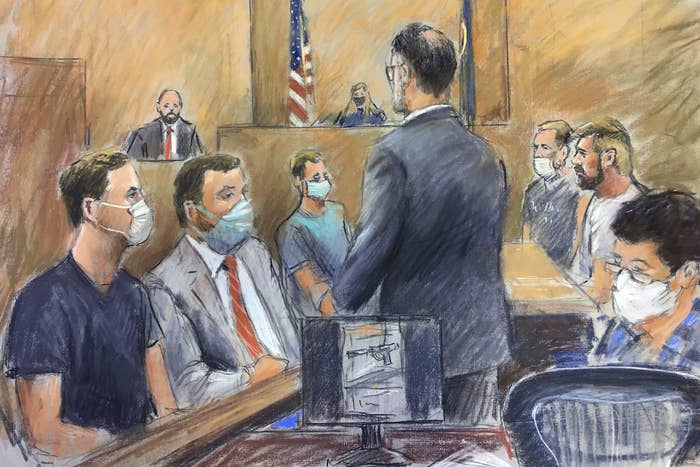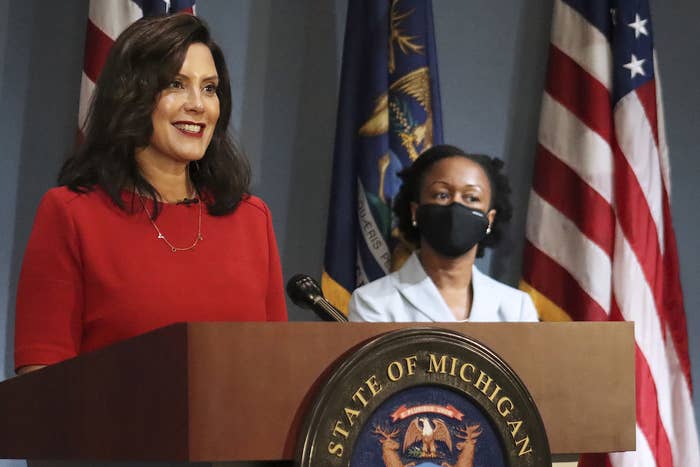
A private intelligence business owned by a lead FBI agent in the Michigan kidnapping case may have tainted the “good faith and integrity of the investigation,” defense attorneys are arguing in a new court filing.
The agent, Jayson Chambers, was the primary handler for a confidential informant who infiltrated the armed militant group Wolverine Watchmen and who played a central role in building the case that they allegedly plotted to kidnap Michigan Gov. Gretchen Whitmer. In August, BuzzFeed News revealed that Chambers had registered a business called Exeintel that was linked to an internet troll who appeared to have tweeted about the case before it became public.

Earlier this month, prosecutors said that the government would not be calling on Chambers to testify at the federal trial in the case, slated to begin March 8, and that discussion of the agent’s “extrinsic” business should not be permitted — even if defense attorneys call him as a witness. But in their Friday filing, attorneys for all five federal defendants facing trial claim that Exeintel is relevant because it represents an “apparent conflict of interest” and they should be permitted to explore the topic at trial.
In materials circulated in 2019 to promote Exeintel, Chambers cited his casework with the FBI, which the defense lawyers said proves he “was attempting to leverage his success in criminal investigations performed for the FBI for his personal profit.” By extension, they claim, it’s possible that Chambers had financial motivation for the kidnapping investigation to result in arrests — and that could explain behavior by the agent they characterize as an attempt to entrap their clients.
The government charged six men with conspiring to kidnap the sitting governor in October 2020. One subsequently pleaded guilty, while five others — Brandon Caserta, Barry Croft, Adam Fox, Kaleb Franks, and Daniel Harris — maintain their innocence and claim the government “initiated” and directed the entire conspiracy. Last week, they asked for the indictment to be dismissed because of “egregious overreaching” by the government, which employed at least a dozen confidential informants during the probe.
Federal prosecutors have denied those allegations, claiming the men were predisposed to commit the crimes. The Michigan attorney general's office has similarly defended its case against eight additional men who were charged with providing material support to terrorism.
To underscore their theory of predisposition, prosecutors are seeking to admit evidence of prior criminal activity by several of the defendants, including two convictions by Croft in the 1990s and one by Franks in 2013. In new filings, defense attorneys say the government “mischaracterizes” the offenses to make them appear more serious, but in fact they bear “no resemblance to the charged offense” and thus have “no value with regard to showing propensity.” An attorney for Croft also noted that he was fully pardoned by the governor of Delaware for both of those convictions in 2018.
A spokesperson for the FBI referred a request for comment to the Justice Department. A spokesperson for the US Attorney’s Office for the Western District of Michigan did not immediately respond to a request for comment but has previously declined to discuss the kidnapping case. Jayson Chambers did not immediately respond to a request for comment.
A particular challenge for prosecutors in what is arguably the highest-profile domestic terrorism case in the country — other than those related to the Capitol insurrection — has been the conduct of the FBI agents in the probe.
One agent, Richard Trask, who was held out as the public face of the case, was fired after being charged with beating his wife in July. A second agent, Henrik Impola, has been accused of perjury in a different case, and in a filing Friday, defense attorneys asked the court’s permission to question him on the stand about that allegation, which prosecutors have termed “unfounded.”
According to evidence shared by the government and cited by defense lawyers in their filing, Chambers may have played a far more important role in the case than the other two. Records show he wrote 227 reports on contacts with the confidential informant known as “Dan,” compared with just five written by Impola and zero by Trask.
Dan, court testimony shows, helped initiate the case in March 2020 and made hundreds of hours of clandestine recordings of the defendants, accompanying them on trips to meetings and training exercises and often paying for their travel expenses. A text message sent by Chambers to Dan in September 2020 stated, “Mission is to kill the governor specifically.”
The FBI has declined to state whether Chambers sought permission from the bureau to register a business while still working full time as an agent. Prosecutors have said that he never made any money from Exeintel and that he abandoned plans to quit the FBI. But public records show that Chambers did not formally dissolve his company until Oct. 29 of this year, “meaning he owned the company throughout the entire investigation of the alleged plot to kidnap Gov. Gretchen Whitmer,” defense attorneys wrote Friday.
